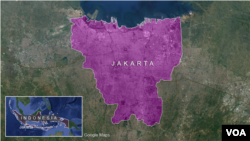A massive demonstration in Jakarta against the governor turned violent Friday night when protesters burned police cars and officers responded with tear gas and water cannons. Police say at least one person was killed and seven wounded in the violence.
The scenes capped off a dramatic day that brought more than 50,000 hard-line Muslim protesters onto the streets to voice their ire at the city's Chinese-Christian governor, Basuki Tjahaja Purnama, who has been accused of blasphemy.
Tensions were high across the capital throughout the day, exacerbated by reports that Islamic State members in Syria had posted messages on social media calling for their followers to carry out attacks during the protest.
The marchers — led by the radical Islamic Defender's Front (FPI) — arrived from across the archipelago to voice their opposition to Basuki, known as "Ahok", who is seeking re-election as Jakarta's governor, in February.
Some chanted "death to Ahok" while others stamped on placards of his image, but violence was averted during the day.
Tensions rose as night fell and tear gas was fired after demonstrators began throwing plastic bottles at their officers early in the evening.
The saga began in October, when Ahok dismissed his political opponents who had cited a Quranic verse that warns against Muslims supporting non-believers.
The embattled governor said that Jakartans had "been lied to" by the verse in question and remarked, "If you feel you can't vote for me because you fear you'll go to hell … no worries. That's your personal right."
Ahok has since apologized and said he never intended to cause offense, but it has done little to placate members of the FPI, who have frequently rallied against him during his tenure as governor. Many among their numbers are enraged that a majority Muslim city is administered by a Christian.
While the outrage of Indonesia's hard Islamic right has dominated Indonesia's headlines in the run up to today's much-hyped protest, voices from the moderate majority have sought to calm tensions.
Both of Indonesia's largest moderate organizations: Muhammadiyah, and Nahdlatul Ulama (NU) — whose memberships number in the tens of millions — told their supporters not to attend the rally, although they did not prohibit it.
Speaking to VOA, Asbit Panatagara, an NU activist, stressed that his organization is "committed to pluralism" and that the reaction to Ahok was overblown. Other moderate leaders have sought to underscore the ideal of a moderate, multicultural Indonesia.
Those who share this vision will be heartened by Ahok's enduring popularity. The governor's public intolerance for time-wasting bureaucrats has won him widespread support. His successes in improving public transport and flood defenses have also helped to boost his approval ratings to 69%, according to some local polls.
"I think for everyday Jakartans religious background is not really a big issue [in picking a governor]," Rendi Witular, editor of the Jakarta Post.
"What they believe is in the performance of the candidate himself, their credentials, and their vision, instead of religious sentiment.
"But there are several fringe radical groups who want to force this issue."
Critics say that the central government, led by President Joko Widodo, has not done enough to face down these radical groups and that hatred and bigotry is being allowed to grow.
Sidney Jones, a longtime analyst of Islamic radicalism and terrorism in Southeast Asia, earlier this month blamed "spineless political leaders" for allowing extremism to foment.
"No one dares draw a line and recognize religiously-inspired incitement for what it is, let alone condemn it or take measures to stop it," she said.
Jones also fears that growing conservatism in Indonesia's political discourse is creating the conditions for resurgent Islamic terror.






